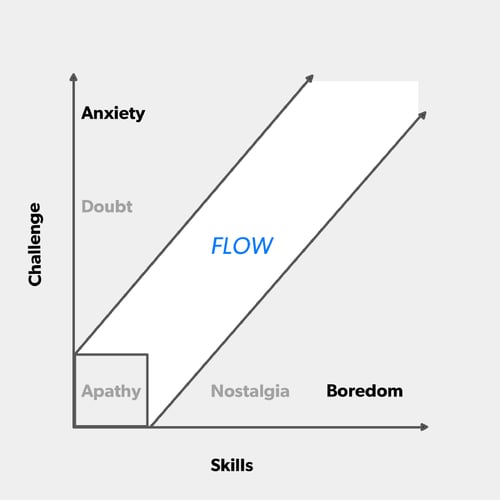Adaptability is essential for effective leadership, enabling leaders to handle complexities and...
Finding Your Flow State
“The best moments in our lives are not the passive, receptive, relaxing times . . . The best moments usually occur if a person’s body or mind is stretched to its limits in a voluntary effort to accomplish something difficult and worthwhile.” Csikszentmihalyi, 1990
Flow state, often described as being "in the zone", is achieved when one is in a state of balance between skill level and challenge. When we operate in flow state, we are in harmony with ourselves and others and describe our days as empowered, energized and growth filled. Being in a state of flow is critical to leading self and being an effective leader for others.

The concept was introduced to the world by Mihaly Csikszentmihalyi, a psychologist known for his research on the study of positive psychology and happiness. He introduced the concept of "flow" in his seminal work "Flow: The Psychology of Optimal Experience," published in 1990. Flow, he describes, is a state of intense focus and absorption in an activity, where one experiences a sense of energized focus, full involvement, and enjoyment in the process of the activity itself. In this state, individuals often lose track of time and experience a sense of effortless action.
Csikszentmihalyi identified several key characteristics of flow:
- Clear goals: Flow experiences typically occur when individuals have clear, attainable goals that provide direction and structure to their actions.
- Immediate feedback: Immediate feedback allows individuals to adjust their actions in real-time, maintaining a state of optimal challenge that keeps them engaged.
- Balance between skill and challenge: Flow tends to occur when the challenge level of an activity matches the individual's skill level. When the challenge is too low, individuals may become bored, while when it's too high, they may become anxious or frustrated.
- Complete concentration: Flow involves deep concentration and focused attention on the task at hand, often resulting in a loss of self-consciousness and a merging of action and awareness.
- Sense of control: Individuals in flow states often feel a sense of control over their actions and the outcome of the activity, even in situations where there is uncertainty or risk.
Csikszentmihalyi's research enables us to understand how flow states can enhance performance, creativity, and overall well-being. For a deeper definition of Flow State - Check out this article from VeryWellMind.com




